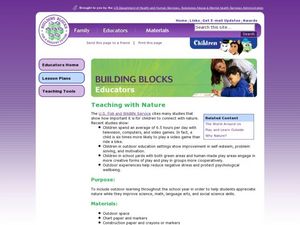Curated OER
Wheel of Trouble
While teaching about endangered species, you can incorporate this activity as a take-home reminder of what is threatening the sea turtle population. It is one of those paper plate projects in which a wedge is cut out to reveal a picture...
California Academy of Science
Buoyancy Bulls-Eye
Why does a seastar sink, but a jellyfish float? Through a fun investigation, learners examine the concept of buoyancy using simple household items. The challenge: create neutral buoyancy for an action figure in water. With ample...
New Mexico State University
Lab 6: Kepler's Laws
A 15-page package thoroughly teaches your physics or astronomy learners about Kepler's three laws of planetary motion. Each one is stated and explained. Class members answer questions, solve problems, and participate in the classic...
Teach Engineering
The Amazing Aerogel
Introducing ... the aerogel. The first of a two-installment series teaches young engineers about the properties and uses of aerogels. A PowerPoint presentation provides information about this unique material to help solidify the concept.
Kenan Fellows
Unit 3: How Drugs Enter/Exit the Body
The third of a four-part series on Pharmacology teaches scholars how drugs enter and exit the body, how they act inside the body, how they affect the brain, and more. Over the course of the unit, groups complete two labs and one...
Curated OER
Pocket Full of Posies: Ceramics
After studying the plant or flower life cycle, have the class create a basket of flowers out of clay. They hone their ceramics skills while they push, pull, then paint clay to look like flowers they've seen in nature. There are several...
Curated OER
Photocells II: The Photoelectric Effect in Photocells
It's not easy to find fabulous physics lesson plans, but School Power Naturally has put together a series of them. In this particular lesson, high schoolers learn about the structure and functioning of photovoltaic cells. They construct...
Curated OER
Junior Solar Sprint Series: Electrical Power
Through scientific inquiry, middle schoolers discover how to arrange solar cells in order to produce electricity. This activity is intended to prepare learners to be able to design and construct solar cars. As with other resources...
Polar Trec
Do You See What Icy?
Here is a lesson that kicks off with a question. "How does ice floating on the ocean act as it melts?" As learners investigate this natural phenomenon, they'll discover that it has a lot to do with temperature, salinity, and the effect...
National Institute of Open Schooling
Compounds of Carbon Containing Halogens (Haloalkanes and Haloarenes)
Halogens comes from a Greek word which translates to make salt. Lesson 27 in the series of 36 teaches pupils about halogens. Pupils read, discuss, and answer questions in order to learn about haloalkanes and haloarenes. From defining...
National Institute of Open Schooling
Ionic Equilibrium
Scientific studies show the older we get, the more acidic we become. The activity extensively teaches high schoolers about acids and bases. By the end of the 14th installment of 36, they can define and explain three concepts of...
American Museum of Natural History
Saving Species
Some scientists dedicate their lives to researching and protecting endangered species. An online lesson teaches about three scientists around the world who do just that. They learn about spiders, mollusks, and reptiles from North...
PHET
Measuring the Interplanetary Magnetic Field
Scientists need to figure out how to measure interplanetary magnetic fields, but the magnetic field of the spacecraft is interfering with their readings. Scholars attempt to solve the problem that has perplexed NASA scientists for years.
Curated OER
Fossil Fuels (Part II), The Geology of Oil
More of a mini-unit than a lesson, these activities lead inquisitors through a survey of oil deposits. In the first part, they read about and view diagrams of sedimentary rock layers that trap oil. Next, they test porosity and...
Science 4 Inquiry
Investigating How Heat Flows
It is impossible to cool down a glass of water by adding ice. Young scientists explore heat transfer through videos, experiments, and interactive games. They quickly catch on that the water melts the ice and things aren't always as they...
Curated OER
Teaching with Nature
Students participate in a nature walk to learn about their natural environments. In this nature study lesson, students brainstorm a list of things to look for on their nature walk. Students go on the nature walk and locate objects they...
Curated OER
The Sounds Of Nature
Second graders investigate the concept of sounds in nature. The sound of a coqui frog is used as an example. They identify species of frogs by listening to the sounds they make. Also, 2nd graders experience and identify other sounds of...
Curated OER
Natural and Recycled Materials Worksheet
In this teaching and learning through objects worksheet, students find and research at least eight material culture artifacts made from different materials by using the websites listed on worksheet.
Curated OER
Life Science Observations: Living vs. Non Living Things
Students investigate the difference between living and non-living things. In this life science lesson, students discover the different characteristics of living things and the natural or human created non-living things....
Curated OER
Feeling Vulnerable
Students discover some of the ways the developing world is vulnerable to the impact and effects of natural disasters. They investigate some "natural disaster hotspots" around the globe and assess how vulnerable these areas are.
Curated OER
Connecticut Wildlife: Biodiversity and Conservation Status of Our Vertebrate Populations
Students explore the different types of vertebrates found in their area. For this environmental science lesson, students perform a case study on the Common Raven. They analyze data collected from research and create charts and graphs.
Curated OER
Teaching about the Effect of pH on Aquatic Organisms
Learners perform experiments to determine the PH, acidity, and buffering qualities of a lake that make them sensitive to acid deposition.
Curated OER
Forces of Nature Word Search Worksheet
In this forces of nature word search worksheet, students analyze 14 words in a word box pertaining to weather and the force of nature. Students find these in a word search puzzle.
University of Georgia
Flavor of Organic Chemistry
Introduce organic chemistry through an analysis of flavor. A three-part unit begins with an overview of the components of flavor. Next, scholars prepare esters through esterification. Finally, they examine how all senses have an impact...

























